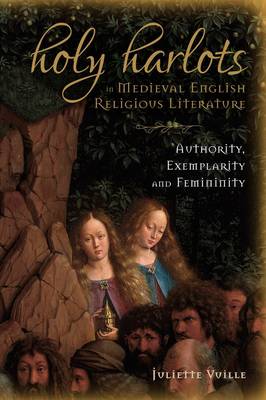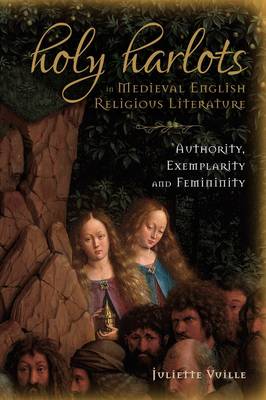
Je cadeautjes zeker op tijd in huis hebben voor de feestdagen? Kom langs in onze winkels en vind het perfecte geschenk!
- Afhalen na 1 uur in een winkel met voorraad
- Gratis thuislevering in België vanaf € 30
- Ruim aanbod met 7 miljoen producten
Je cadeautjes zeker op tijd in huis hebben voor de feestdagen? Kom langs in onze winkels en vind het perfecte geschenk!
- Afhalen na 1 uur in een winkel met voorraad
- Gratis thuislevering in België vanaf € 30
- Ruim aanbod met 7 miljoen producten
Zoeken
Holy Harlots in Medieval English Religious Literature
Authority, Exemplarity and Femininity
Juliette Vuille
€ 209,45
+ 418 punten
Omschrijving
During the Middle Ages, the lives of saints such as Mary Magdalen and Mary of Egypt - "holy harlots", women who repented of an early life of licentiousness to become blessed - were hugely popular, for both clerical and laypersons, men and women alike. These legends are rife with paradox: the saints are presented as epitomes of a type of femininity universally accepted as a model for all Christians to emulate in their quest for salvation, but at the same time they constitute marginal figures who could be petitioned in support of unconventional beliefs and lifestyles. The holy harlot's potential to contain the markers of both sainthood and whoredom within a single female body was however rejected in the sixteenth century, and so this fascinating model of sanctity has since been largely overlooked.
This book, the first full-length study on the topic, aims to redress the situation, demonstrating that the seapparent outliers transformed mainstream concepts of piety and womanhood. It uses the Old English Martyrology and the Old English Life of Mary of Egypt to show that the early English conceived harlots becoming saints as a move from female to queer rather than as a gender inversion. In the later Middle Ages, "holy harlot" lives in the French of England and in Middle English (including the South English Legendary, the Digby Mary Magdalene, and in lives by John Mirk and Osbern Bokenham) are shown to demonstrate the centrality, from the twelfth-century rise of affective piety, of the harlot saints' femininity as a model for Everyman. They can also be seen as an influence on the writings of such women as Christina of Markyate, Margery Kempe, and Elizabeth Barton, and key to the self-representation of Bernard of Clairvaux and the Wycliffites.
This book, the first full-length study on the topic, aims to redress the situation, demonstrating that the seapparent outliers transformed mainstream concepts of piety and womanhood. It uses the Old English Martyrology and the Old English Life of Mary of Egypt to show that the early English conceived harlots becoming saints as a move from female to queer rather than as a gender inversion. In the later Middle Ages, "holy harlot" lives in the French of England and in Middle English (including the South English Legendary, the Digby Mary Magdalene, and in lives by John Mirk and Osbern Bokenham) are shown to demonstrate the centrality, from the twelfth-century rise of affective piety, of the harlot saints' femininity as a model for Everyman. They can also be seen as an influence on the writings of such women as Christina of Markyate, Margery Kempe, and Elizabeth Barton, and key to the self-representation of Bernard of Clairvaux and the Wycliffites.
Specificaties
Betrokkenen
- Auteur(s):
- Uitgeverij:
Inhoud
- Aantal bladzijden:
- 297
- Taal:
- Engels
- Reeks:
- Reeksnummer:
- nr. 17
Eigenschappen
- Productcode (EAN):
- 9781843845898
- Verschijningsdatum:
- 16/04/2021
- Uitvoering:
- Hardcover
- Formaat:
- Genaaid
- Afmetingen:
- 156 mm x 234 mm
- Gewicht:
- 594 g

Alleen bij Standaard Boekhandel
+ 418 punten op je klantenkaart van Standaard Boekhandel
Beoordelingen
We publiceren alleen reviews die voldoen aan de voorwaarden voor reviews. Bekijk onze voorwaarden voor reviews.









